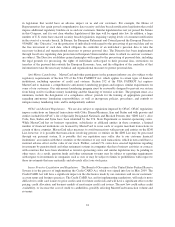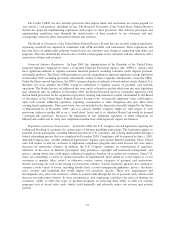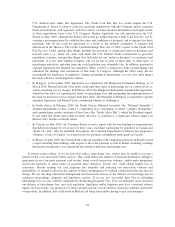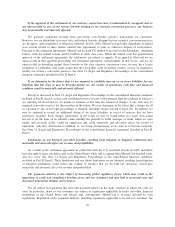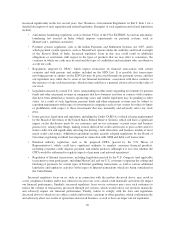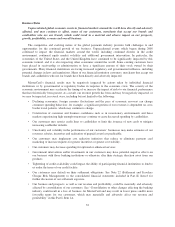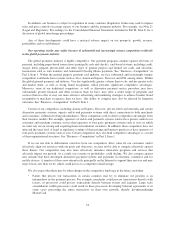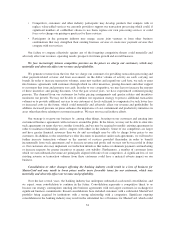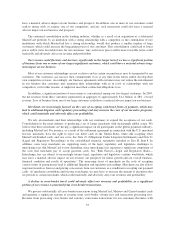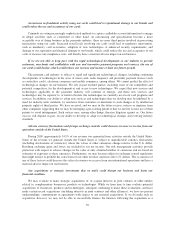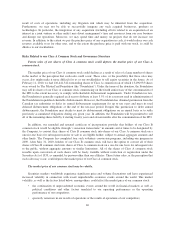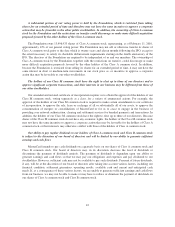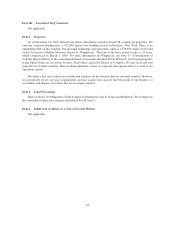MasterCard 2009 Annual Report Download - page 43
Download and view the complete annual report
Please find page 43 of the 2009 MasterCard annual report below. You can navigate through the pages in the report by either clicking on the pages listed below, or by using the keyword search tool below to find specific information within the annual report.In addition, our business is subject to regulation in many countries. Regulatory bodies may seek to impose
rules and price controls on certain aspects of our business and the payments industry. For example, see Note 21
(Legal and Regulatory Proceedings) to the Consolidated Financial Statements included in Part II, Item 8, for a
discussion of global interchange proceedings.
Any of these developments could have a material adverse impact on our prospects, growth, revenue,
profitability and overall business.
Our operating results may suffer because of substantial and increasingly intense competition worldwide
in the global payments industry.
The global payments industry is highly competitive. Our payment programs compete against all forms of
payment, including paper-based transactions (principally cash and checks), card-based systems, including credit,
charge, debit, prepaid, private-label and other types of general purpose and limited use cards, and electronic
transactions such as wire transfers and Automated Clearing House payments. See “Business—Competition” in
Part I, Item 1. Within the general purpose payment card industry, we face substantial and increasingly intense
competition worldwide from systems such as Visa, American Express, Discover and JCB, among others. Within
the global general payment card industry, Visa has significantly greater volume than we do, and has greater scale
and market share, as well as strong brand recognition, which provides significant competitive advantages.
Moreover, some of our traditional competitors, as well as alternative payment service providers, may have
substantially greater financial and other resources than we have, may offer a wider range of programs and
services than we offer or may use more effective advertising and marketing strategies to achieve broader brand
recognition or merchant acceptance than we have. Our ability to compete may also be affected by litigation
outcomes. See “Business—Competition” in Part I, Item 1.
Certain of our competitors, including American Express, Discover, private-label card networks and certain
alternative payments systems, operate end-to-end payments systems with direct connections to both merchants
and consumers, without involving intermediaries. These competitors seek to derive competitive advantages from
their business models. For example, operators of end-to-end payments systems tend to have greater control over
consumer and merchant customer service than operators of four party payments systems such as ours, in which
we must rely on our issuing and acquiring financial institution customers. In addition, these competitors have not
attracted the same level of legal or regulatory scrutiny of their pricing and business practices as have operators of
four-party payments systems such as ours. Certain competitors may also hold competitive advantages as a result
of their organizational structures. See “Business—Competition” in Part I, Item 1.
If we are not able to differentiate ourselves from our competitors, drive value for our customers and/or
effectively align our resources with our goals and objectives, we may not be able to compete effectively against
these threats. Our competitors may also more effectively introduce innovative programs and services that
adversely impact our growth. As a result, our revenue or profitability could decline. We also compete against
new entrants that have developed alternative payment systems and payments in electronic commerce and for
mobile devices. A number of these new entrants rely principally on the Internet to support their services and may
enjoy lower costs than we do, which could put us at a competitive disadvantage.
We also expect that there may be other changes in the competitive landscape in the future, including:
• Parties that process our transactions in certain countries may try to eliminate our position as an
intermediary in the payment process. For example, merchants could process transactions directly with
issuers, or processors could process transactions directly between issuers and acquirers. Large scale
consolidation within processors could result in these processors developing bilateral agreements or in
some cases processing the entire transaction on their own network, thereby dis-intermediating
MasterCard.
33



